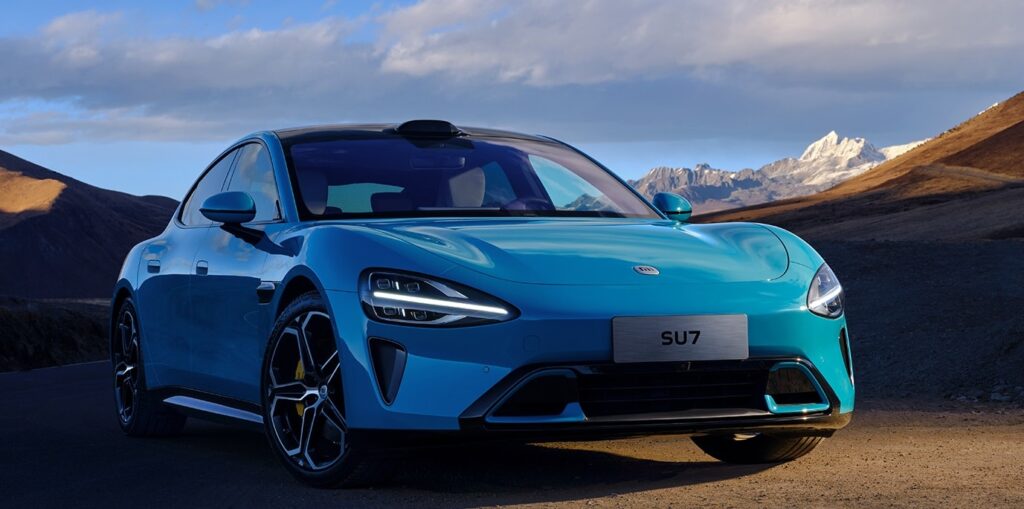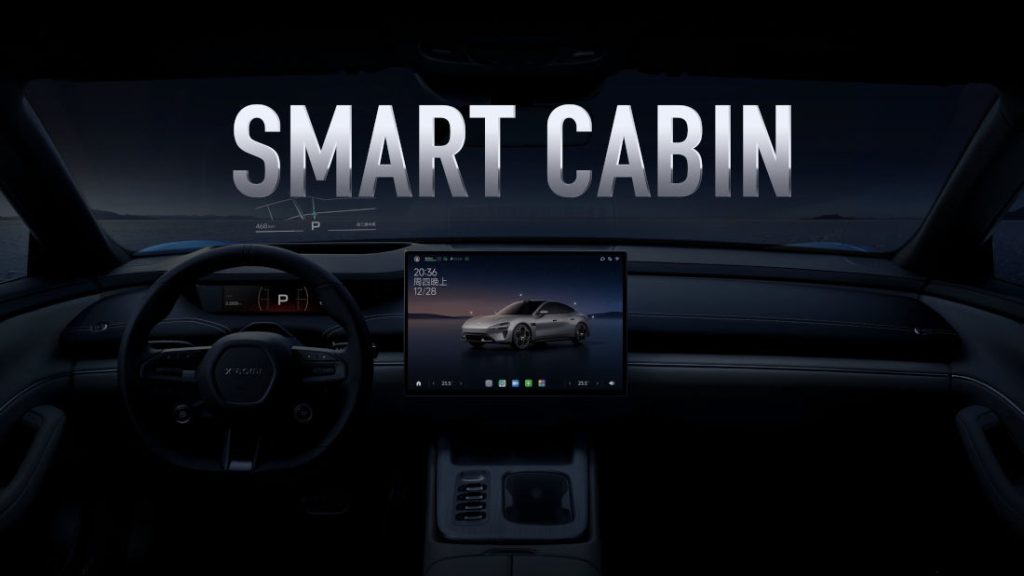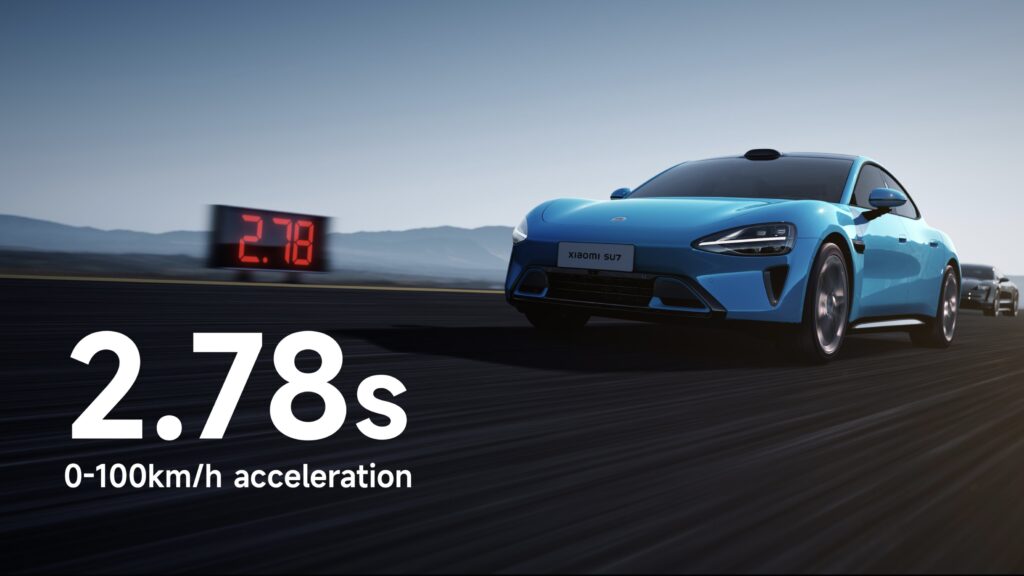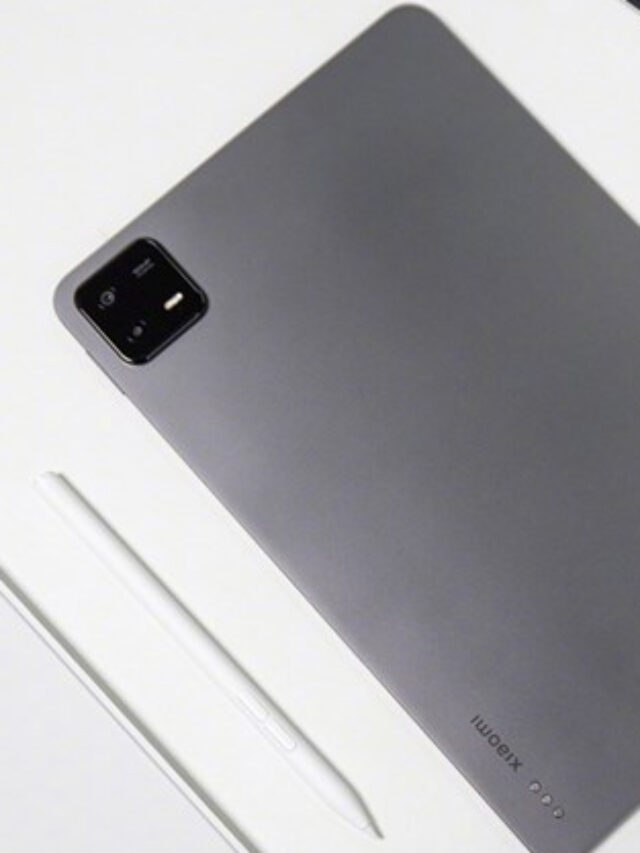
Table of Contents
Introduction
With the introduction of the revolutionary Xiaomi SU7 electric sedan and the release of Xiaomi EV’s five key technologies, Xiaomi’s entry into the automotive sector represents a paradigm shift. This article examines Xiaomi’s notable transition from smartphones to smart cars, emphasizing the cutting-edge innovations that are reshaping the automotive industry.
Xiaomi Electric Car Price in India
With the introduction of its electric vehicle, Xiaomi is entering the automotive sector, and as such, the pricing strategy for the Indian market becomes crucial. Xiaomi wants to change the way people think about mobility by bringing affordable, cutting-edge vehicles to a larger market. The estimated price of the Xiaomi Electric Car in India is between 200,000 yuan to 300,000 yuan (around Rs 25 to 35 lakh).
Key Factors Influencing Xiaomi Electric Car Prices in India
- Technology Stack Integration: The total cost structure is influenced by Xiaomi’s bottom-up strategy of integrating smart software, AI, and industrial manufacturing. Xiaomi electric vehicles have a strong value proposition thanks to their advanced technology stack.
- R&D Investment: Xiaomi EV hopes to establish itself as a leader in fundamental automotive technologies by allocating more than 10 billion CNY to research and development. The pricing strategy may change as a result of this innovation investment, reflecting the value of ground-breaking features.
- E-Motor Performance: Xiaomi’s commitment to pushing performance limits is demonstrated by the release of record-breaking E-motors like the HyperEngine V8s and V6/V6s. The power and efficiency of these motors could have an impact on Xiaomi electric cars’ final cost in India.
- Battery Technology: The CTB Integrated Battery Technology from Xiaomi greatly enhances the overall performance of the electric car with its remarkable efficiency and safety features. One of the most important factors in choosing the pricing strategy is the cost of advanced battery technology.
- Die-Casting Innovations: Xiaomi’s die-casting innovations, such as the Titans Metal Alloy and T9100 cluster, optimize manufacturing procedures and lower the overall weight of cars. These developments might result in financial savings, which might affect how reasonably priced Xiaomi electric vehicles are in India.
- Features for Autonomous Driving: Xiaomi’s cutting-edge autonomous driving technologies elevate its electric vehicles to a higher level. Features like Super-Res Occupancy Network Technology and Adaptive BEV Technology may affect the price because they require an investment in intelligent software.
- Features of the Smart Cabin: The cutting-edge Smart Cabin enhances the in-car experience overall with its array of interactive screens and artificial intelligence computing power. The ultimate pricing will be influenced by the cost of these sophisticated cabin features.
Xiaomi’s Approach to Affordable Electric Mobility
Not only is Xiaomi breaking new ground in the automotive industry with its entry, but it also aims to lower the cost and increase accessibility to electric vehicles. Xiaomi wants to completely change the electric vehicle market in India by strategically utilizing its knowledge of consumer electronics and smart manufacturing.
Anticipated Xiaomi Electric Car Prices in India
Xiaomi is committed to affordability, so even though precise pricing information might not be revealed until closer to the official launch, it suggests competitive pricing in the electric car market. The company’s goal is to provide a cost-effective mobility solution that is both tech-savvy and environmentally friendly.
As Xiaomi’s creative approach continues to upend industries, the price of electric cars in India is expected to strike a balance between accessibility and state-of-the-art features, making them a desirable choice for customers who care about the environment.
As the company makes significant progress in redefining the future of smart and sustainable mobility, keep checking back for updates on Xiaomi Electric Car prices in India.

Xiaomi’s Entry into Automotive Industry
The CEO and founder of Xiaomi, Lei Jun, highlighted the company’s calculated entry into the automotive sector, framing it as an essential step in completing the “Human x Car x Home” smart ecosystem. In 15 to 20 years, Xiaomi wants to rank among the world’s leading automakers, demonstrating its long-term dedication to fundamental core technologies.
Core Technologies Unveiled
E-Motor Innovations
With a maximum speed of 27,200 rpm, Xiaomi’s HyperEngine V8s set a global record. The company also displayed other E-motors. The cutting-edge cooling system and distinctive oil circuit arrangements raise the bar for electric motor performance.
Breakthroughs in Battery Technology
With a 24.4% increase in overall performance, a 77.8% integration efficiency, and a 17mm shorter height, Xiaomi’s CTB Integrated Battery Technology is impressive. Long-distance travel is made stable and dependable by safety features like a dual-side water cooling system and a 14-layer protection system.
Xiaomi Die-Casting Advancements
Large-scale die-casting and materials are redefined by the Xiaomi Die-Casting T9100 cluster and its exclusive alloy, Xiaomi Titans Metal. This invention increases overall manufacturing process efficiency, decreases vehicle weight, and streamlines production.
Xiaomi Pilot Autonomous Driving
In terms of autonomous driving, Xiaomi is a pioneer with its Super-Res Occupancy Network Technology, Road-Mapping Foundational Model, and Adaptive BEV Technology. With the use of these technologies, Xiaomi has become a leader in intelligent software technology by improving perception, recognizing road conditions, and detecting obstacles.
Smart Cabin Features
With a 56-inch HUD head-up display, a 7.1-inch rotating dashboard, and a 16.1-inch 3K central console, Xiaomi EV’s Smart Cabin boasts a “human-centric” interaction architecture. Up to five screens can be connected seamlessly through the Snapdragon 8295 in-car chip, enabling an immersive interactive experience.

Redefining the Technology Stack
Xiaomi EV stands out for its dedication to a bottom-up strategy that begins with fundamental core technologies. The technological landscape of the automotive industry has undergone a significant shift with the integration of AI, smart software, and industrial manufacturing.
Xiaomi EV’s Investment and R&D Commitment
By investing ten times more than ten billion CNY, Xiaomi EV shows that it is dedicated to “conscientiously building a great car.” Over 3,400 engineers worldwide make up the R&D team, which reveals innovations in die-casting, autonomous driving, battery technology, e-motor technology, and smart cabin technology.
E-Motor Development
HyperEngine V8s: Breaking Records
With a top speed of 27,200 rpm, HyperEngine V8s break all previous records. It is an E-motor that leads the industry and is ready for mass production in 2025 thanks to its creative cooling design and silicon steel laminations.
HyperEngine V6/V6s: Leading Rotational Speed
The HyperEngine V6 and V6s E-motors from Xiaomi have a rotational speed of 21,000 rpm, which is faster than any mass-produced electric motor in the world. These motors break new performance records for electric motors with their extraordinary power and torque.
Battery Breakthroughs
CTB Integrated Battery Technology
With Xiaomi’s CTB Integrated Battery Technology, performance is improved by 24.4%, integration efficiency is 77.8%, and height is reduced by 17mm. Stable performance is guaranteed during long-distance travel thanks to the safety features, which include a 14-layer protection system.
Xiaomi Die-Casting Innovations
T9100 Cluster and Titans Metal Alloy’T9100 Cluster and Titans Metal Alloy
Large-scale die-casting and materials are redefined by Xiaomi Die-Casting T9100 and Xiaomi Titans Metal. This invention increases overall manufacturing process efficiency, decreases vehicle weight, and streamlines production.
Xiaomi’s Pioneer Autonomous Driving Technologies
Adaptive BEV Technology
With its innovative Adaptive BEV Technology, Xiaomi offers greater visibility, longer vision, and accuracy in a variety of driving situations. With safety and accuracy guaranteed, the industry-leading innovation modifies perception algorithms according to the situation.
Road-Mapping Foundational Model
Real-time recognition and intelligent trajectory adjustments are made possible by the revolutionary Road-Mapping Foundational Model, which transforms the perception of road conditions. Without using high-definition maps, Xiaomi’s autonomous driving system maneuvers through intricate intersections with ease.
Super-Res Occupancy Network Technology
Super-Res Occupancy Network Technology from Xiaomi improves recognition accuracy by achieving an infinite number of categories of recognition for irregular obstacles. The novel vector algorithm improves accuracy to as low as 0.1m by simulating objects as continuous curved surfaces.
Xiaomi Smart Cabin: Revolutionizing Interiors
With a 56-inch HUD head-up display, a 7.1-inch rotating dashboard, and a 16.1-inch 3K central console, Xiaomi EV’s Smart Cabin boasts a “human-centric” interaction architecture. Up to five screens can be connected seamlessly through the Snapdragon 8295 in-car chip, enabling an immersive interactive experience.
Xiaomi SU7: The Dream Car
Performance Capabilities
Positioned as a “full-size high-performance eco-technology sedan,” the Xiaomi SU7 accelerates from zero to one hundred miles per hour in an astounding 2.78 seconds. It firmly establishes itself in the “sub-2-second supercar” club with a top speed of 265 km/h.

Smart Chassis Control Algorithm
With its proprietary Smart Chassis control algorithm, the Xiaomi SU7 offers adaptive dynamic chassis control at the millisecond level in all conditions. Driving is made stable and practically “bump-free” as a result.
Ecosystem Empowerments
With the integration of hardware, applications, and third-party CarIoT ecosystems, Xiaomi SU7 offers a mobile space experience that is unmatched in intelligence. Open to outside parties, the Xiaomi CarIoT ecosystem offers retrofit options for current devices along with standardized interfaces and communication protocols.
Completing the “Human x Car x Home” Smart Ecosystem
The “Human x Car x Home” smart ecosystem replaces the “Smartphone x AIoT” focus in Xiaomi’s strategic plan. Now that Xiaomi EV has joined the ecosystem, it is fully functional and allows for easy communication and cooperation between homes, cars, and people.
Conclusion
With a focus on foundational core technologies, strategic investments, and the completion of the “Human x Car x Home” smart ecosystem, Xiaomi’s entry into the automotive industry represents a significant leap. The auto industry is being redefined by Xiaomi EV’s innovations in die-casting, autonomous driving, e-motor, battery, and smart cabin technologies.
FAQs
When will HyperEngine V8s be mass-produced?
In 2025, HyperEngine V8s are expected to go into mass production and be installed in Xiaomi EVs.
What is the maximum capacity of Xiaomi’s CTB Integrated Battery?
The maximum capacity of Xiaomi’s CTB Integrated Battery is 150 kWh.
How does Xiaomi SU7 achieve a zero-to-hundred acceleration in 2.78 seconds?
The Xiaomi SU7’s in-house designed HyperEngine E-motor allows for this remarkable acceleration.
Can Xiaomi EV connect with other Xiaomi smart home devices?
Indeed, over a thousand Xiaomi smart home appliances are fully supported by Xiaomi EV for a smooth integration that builds a strong CarIoT ecosystem.
What makes Xiaomi’s autonomous driving system unique?
Thanks to advancements like Super-Res Occupancy Network Technology, Road-Mapping Foundational Model, and Adaptive BEV Technology, Xiaomi’s autonomous driving system is unparalleled and guarantees safety and accuracy in a variety of situations.
What is the estimated price of the Xiaomi Electric Car in India?
The estimated price of the Xiaomi Electric Car in India is between 200,000 yuan to 300,000 yuan (around Rs 25 to 35 lakh).
Xiaomi Electric Car Price in India
In India, the Xiaomi Electric Car is expected to cost between 200,000 and 300,000 yuan, or roughly Rs 25 to Rs 35 lakh.
How long does the Xiaomi Yi 1080p car last?
The battery life of the Xiaomi Yi 1080p car camera varies based on usage. When fully charged, it usually lasts for several hours, which makes it ideal for long recording sessions.









